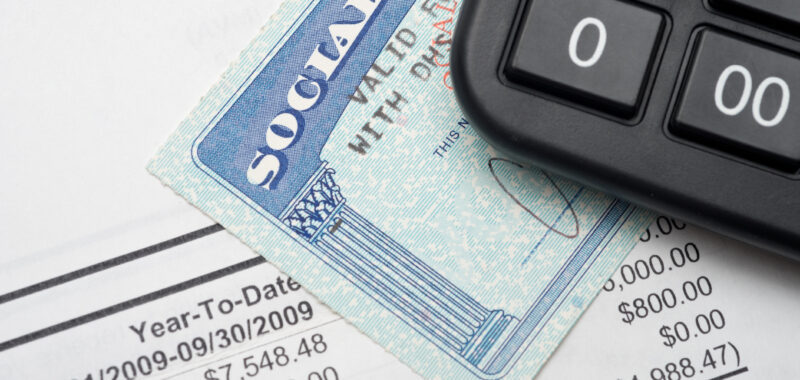This strategy helps you take back control of the size of your check.
The age at which you decide to claim Social Security retirement benefits can have a huge impact on the size of your monthly check. Those claiming early typically receive a smaller benefit than those who wait. All else being equal, the difference between claiming your Social Security benefits at age 62 compared to waiting until age 70 can be as much as a 77% increase in your benefits.
But even if you’ve already started Social Security, it might not be too late to increase your benefits. There’s a little-known rule that can help boost your benefit, and some seniors will qualify for an increase of 26.7%.

Image source: Getty Images.
How the government calculates your Social Security benefit
Before we go over the strategy to boost your benefit even after claiming, it’s important to understand how the government calculates your monthly check. There are just three factors that determine how much you receive:
- Your earnings history
- The year you were born
- The age you claim benefits
Once you become eligible for Social Security, the Social Security Administration, or SSA, will look at your earnings history from your entire career. Any earnings from before you reached age 60 are adjusted upwards for wage inflation. It then selects the 35 highest-earning years from your career and calculates the monthly average earnings of those years.
The SSA then plugs that number into the Social Security benefits formula, which will determine your primary insurance amount, or PIA. That’s the amount you’ll receive if you apply for benefits starting the month you reach your full retirement age.
Your full retirement age depends on when you were born. Those born between 1943 and 1954 reached full retirement age at 66 years old. The full retirement age increases two months for each year you were born after 1954 until maxing out at age 67 for anyone born in 1960 or later.
If you claim before your full retirement age, the SSA will reduce your monthly benefit. You can also delay your retirement past full retirement age. In that case, you’ll earn delayed retirement credits for each month you wait to apply, maxing out once you reach age 70.
The table shows the impact claiming age has on your monthly benefit relative to your PIA.
| Year Born | Age 62 | Age 63 | Age 64 | Age 65 | Age 66 | Age 67 | Age 68 | Age 69 | Age 70 or later |
|---|---|---|---|---|---|---|---|---|---|
| 1943 to 1954 | 75% | 80% | 86.7% | 93.3% | 100% | 108% | 116% | 124% | 132% |
| 1955 | 74.2% | 79.2% | 85.6% | 92.2% | 98.9% | 106.7% | 114.7% | 122.7% | 130.7% |
| 1956 | 73.3% | 78.3% | 84.4% | 91.1% | 97.8% | 105.3% | 113.3% | 121.3% | 129.3% |
| 1957 | 72.5% | 77.5% | 83.3% | 90% | 96.7% | 104% | 112% | 120% | 128% |
| 1958 | 71.7% | 76.7% | 82.2% | 88.9% | 95.6% | 102.7% | 110.7% | 118.7% | 126.7% |
| 1959 | 70.8% | 75.8% | 81.1% | 87.8% | 94.4% | 101.3% | 109.3% | 117.3% | 125.3% |
| 1960 or later | 70% | 75% | 80% | 86.7% | 93.3% | 100% | 108% | 116% | 124% |
Data source: Social Security Administration.
As you can see, waiting until age 70 or later can result in a boost of 24% to 32% above your PIA. But there’s a way you can earn those valuable delayed retirement credits even if you’ve already applied for Social Security.
The little-known rule that can boost your benefit
There are a lot of different ways your Social Security benefit could change after you claim, but one rule gives you a lot more control over those monthly payments: Once you reach full retirement age, the SSA will allow you to suspend your benefits.
When you suspend benefits, you’ll temporarily stop receiving a monthly check from Social Security. In exchange, you’ll start accruing delayed retirement credits. Those credits are worth two-thirds of a percent of your previous monthly benefit for each month your benefits remain suspended.
You can elect to suspend your benefits at any point once you reach full retirement age. The suspension begins the month after the SSA approves your application. If you don’t resume them before reaching age 70, the SSA will automatically resume benefits for you the month you turn 70 years old.
If someone born in 1958 who hasn’t reached full retirement age yet decides to suspend benefits starting the month they reach 66 years and eight months, they could eventually boost their benefit by 26.7% once payments resume at age 70. Those already past full retirement age but aren’t yet 70 could still boost their benefit by a smaller amount. Younger retirees could get a smaller boost (between 24% and 25.3%) if they suspend benefits when they reach full retirement age over the next few years.
Before you submit your application to suspend benefits, though, it’s important to consider a few things. First, anyone collecting benefits based on your earnings record (a spouse or minor child) will also stop receiving those benefits. Spouses receiving spousal benefits will revert to their personal retirement benefit if they’re eligible.
Second, retirees on Medicare will be responsible for paying Part B premiums out of pocket. The SSA typically deducts those premiums from beneficiaries’ monthly checks, but there won’t be any check to deduct from if you’re not collecting benefits.
If you can handle a few years without receiving Social Security checks each month, suspending benefits could be a great choice for you. Ultimately, you’ll end up with a much bigger check, which could be extremely valuable in old age.

